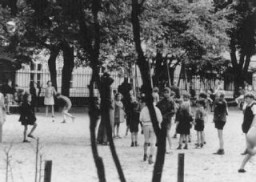You searched for: University%20of%20Oklahoma%EF%BF%BD%EF%BF%BD%EF%BF%BD%EF%BF%BD%EF%BF%BD%EF%BF%BD%EF%BF%BD%EF%BF%BD%EF%BF%BD%EF%BF%BD%EF%BF%BD%EF%BF%BD%EF%BF%BD%EF%BF%BD%EF%BF%BDWeChat%EF%BF%BD%EF%BF%BD%EF%BF%BDaptao168%EF%BF%BD%EF%BF%BD%EF%BF%BDEAFBJM58
<< Previous | Displaying results 276-300 of 315 for "University%20of%20Oklahoma%EF%BF%BD%EF%BF%BD%EF%BF%BD%EF%BF%BD%EF%BF%BD%EF%BF%BD%EF%BF%BD%EF%BF%BD%EF%BF%BD%EF%BF%BD%EF%BF%BD%EF%BF%BD%EF%BF%BD%EF%BF%BD%EF%BF%BDWeChat%EF%BF%BD%EF%BF%BD%EF%BF%BDaptao168%EF%BF%BD%EF%BF%BD%EF%BF%BDEAFBJM58" | Next >>
-
Gerd Jacob Zwienicki
ID CardGerd was the eldest of four children. His father, Josef, had left Ukraine in 1913 and opened a bicycle sales and repair shop in Bremen. His mother, Selma, was descended from a distinguished Jewish family and had been a kindergarten teacher and a bookkeeper for a large firm. As a child, Gerd experienced the hardships of the Depression and witnessed the violent street fights between the Nazis and their political opponents, the Communists and Socialists. 1933–39: When the Nazis came to power in 1933, Gerd…
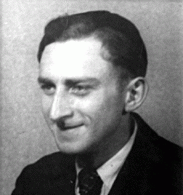
-
Charlene Schiff describes her liberation by Soviet troops
Oral HistoryBoth of Charlene's parents were local Jewish community leaders, and the family was active in community life. Charlene's father was a professor of philosophy at the State University of Lvov. World War II began with the German invasion of Poland on September 1, 1939. Charlene's town was in the part of eastern Poland occupied by the Soviet Union under the German-Soviet Pact of August 1939. Under the Soviet occupation, the family remained in its home and Charlene's father continued to teach. The Germans…
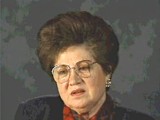
-
Thomas Buergenthal describes the charges brought at the International Military Tribunal at Nuremberg
Oral HistoryJudge Thomas Buergenthal was one of the youngest survivors of the Auschwitz and Sachsenhausen concentration camps. He immigrated to the United States at the age of 17. Judge Buergenthal devoted his life to international and human rights law. He served as chairman of the United States Holocaust Memorial Museum’s Committee on Conscience; was named the Lobingier Professor of Comparative Law and Jurisprudence at the George Washington University Law School; and served for a decade as the American judge at…
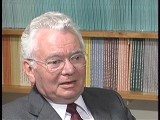
-
Thomas Buergenthal describes differing perspectives on international justice
Oral HistoryJudge Thomas Buergenthal was one of the youngest survivors of the Auschwitz and Sachsenhausen concentration camps. He immigrated to the United States at the age of 17. Judge Buergenthal devoted his life to international and human rights law. He served as chairman of the United States Holocaust Memorial Museum’s Committee on Conscience; was named the Lobingier Professor of Comparative Law and Jurisprudence at the George Washington University Law School; and served for a decade as the American judge at…
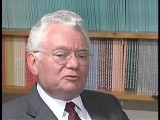
-
Thomas Buergenthal describes the plight of refugees today
Oral HistoryJudge Thomas Buergenthal was one of the youngest survivors of the Auschwitz and Sachsenhausen concentration camps. He immigrated to the United States at the age of 17. Judge Buergenthal devoted his life to international and human rights law. He served as chairman of the United States Holocaust Memorial Museum’s Committee on Conscience; was named the Lobingier Professor of Comparative Law and Jurisprudence at the George Washington University Law School; and served for a decade as the American judge at…
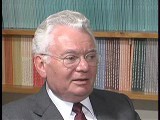
-
Thomas Buergenthal discusses whether it is ever too late to seek justice
Oral HistoryJudge Thomas Buergenthal was one of the youngest survivors of the Auschwitz and Sachsenhausen concentration camps. He immigrated to the United States at the age of 17. Judge Buergenthal devoted his life to international and human rights law. He served as chairman of the United States Holocaust Memorial Museum’s Committee on Conscience; was named the Lobingier Professor of Comparative Law and Jurisprudence at the George Washington University Law School; and served for a decade as the American judge at…
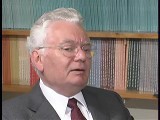
-
Sophie Turner-Zaretsky describes her education in London
Oral HistorySophie was born Selma Schwarzwald to parents Daniel and Laura in the industrial city of Lvov, two years before Germany invaded Poland. Daniel was a successful businessman who exported timber and Laura had studied economics. The Germans occupied Lvov in 1941. After her father's disappearance on her fifth birthday in 1941, Sophie and her mother procured false names and papers and moved to a small town called Busko-Zdroj. They became practicing Catholics to hide their identities. Sophie gradually forgot that…
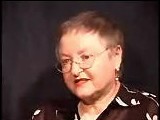
-
Charlene Schiff describes a clandestine school for children in the Horochow ghetto
Oral HistoryBoth of Charlene's parents were local Jewish community leaders, and the family was active in community life. Charlene's father was a professor of philosophy at the State University of Lvov. World War II began with the German invasion of Poland on September 1, 1939. Charlene's town was in the part of eastern Poland occupied by the Soviet Union under the German-Soviet Pact of August 1939. Under the Soviet occupation, the family remained in its home and Charlene's father continued to teach. The Germans…
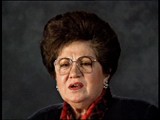
-
Charlene Schiff describes the German invasion of her town, Horochow, in the summer of 1941
Oral HistoryBoth of Charlene's parents were local Jewish community leaders, and the family was active in community life. Charlene's father was a professor of philosophy at the State University of Lvov. World War II began with the German invasion of Poland on September 1, 1939. Charlene's town was in the part of eastern Poland occupied by the Soviet Union under the German-Soviet Pact of August 1939. Under the Soviet occupation, the family remained in its home and Charlene's father continued to teach. The Germans…
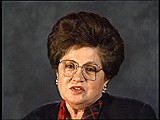
-
Charlene Schiff describes foraging for food in order to survive in forests after escaping from the Horochow ghetto
Oral HistoryBoth of Charlene's parents were local Jewish community leaders, and the family was active in community life. Charlene's father was a professor of philosophy at the State University of Lvov. World War II began with the German invasion of Poland on September 1, 1939. Charlene's town was in the part of eastern Poland occupied by the Soviet Union under the German-Soviet Pact of August 1939. Under the Soviet occupation, the family remained in its home and Charlene's father continued to teach. The Germans…
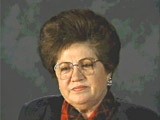
-
Peter Becker describes indoctrination and being in the Hitler Youth
Oral HistoryPeter was six years old when his mother enrolled him in a special Hitler boarding school for future Nazi Party officials in 1935. He studied traditional academic subjects, but was constantly exposed to Nazi ideas and prepared for a military life. Peter was also a member of the Hitler Youth. He came to believe in Hitler as the savior of Germany. Peter would later describe his indoctrination as a subtle process. It took two years after the war had ended for Peter to come to terms with the atrocities that the…
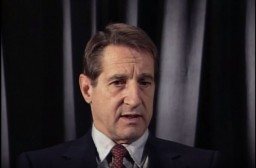
-
Mir
ArticleThe Mir ghetto was established in Mir, Poland in 1941. Learn more about life and resistance in the ghetto.
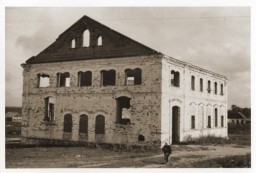
-
Martin Niemöller: Biography
ArticleProtestant pastor Martin Niemöller emerged as an opponent of Adolf Hitler and was imprisoned in camps for 7 years. Learn about the complexities surrounding his beliefs.
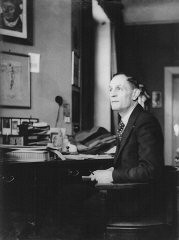
-
Nazi Book Burnings: Recurring Symbol
ArticleBook burnings and bans were not exclusive to—and did not end with—the Nazi regime. Learn more about the symbolism of book burnings.
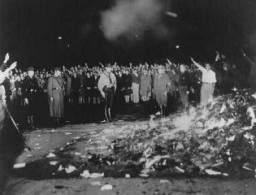
-
Berga-Elster ("Schwalbe V")
ArticleAt the Berga-Elster subcamp of Buchenwald, prisoners were forced to do dangerous and brutal work in tunnels to support fuel production for the German war effort.
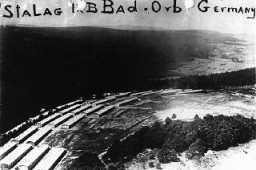
-
Charles E. Coughlin
ArticleCharles Coughlin, Catholic priest and populist leader, promoted antisemitic and pro-fascist views. In the 1930s, he was one of the most influential public figures in the US.
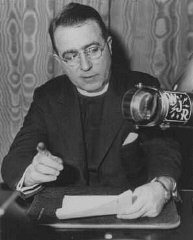
-
How did German professionals and civil leaders contribute to the persecution of Jews and other groups?
Discussion QuestionHow involved in the Holocaust were German professionals and civil leaders? What were some of the motivations and pressures that led to a wide range of behavior? What indeed was the range of behavior, from complying to perpetrating?Explore t...
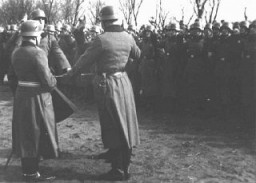
-
Hitler Youth
ArticleThe Hitler Youth and the League of German Girls were developed as Nazi Party youth groups to indoctrinate children and youth in Nazi ideology and policy.
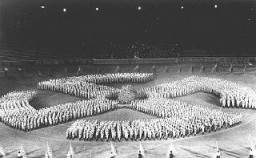
-
Röhm Purge
ArticleThe Röhm Purge (the “Night of the Long Knives") was the murder of the leadership of the SA (Storm Troopers), the Nazi paramilitary formation led by Ernst Röhm. Learn more.
-
Magnus Hirschfeld
ArticleA leading researcher of sex, sexuality, and gender, German Jewish doctor Magnus Hirschfeld was forced to live in exile after the Nazi rise to power.
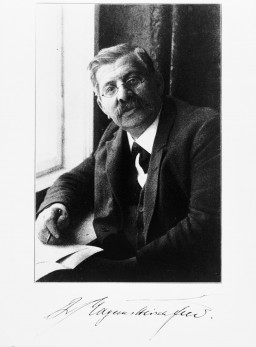
-
Charlene Schiff describes being caught while trying to smuggle food into the Horochow ghetto
Oral HistoryBoth of Charlene's parents were local Jewish community leaders, and the family was active in community life. Charlene's father was a professor of philosophy at the State University of Lvov. World War II began with the German invasion of Poland on September 1, 1939. Charlene's town was in the part of eastern Poland occupied by the Soviet Union under the German-Soviet Pact of August 1939. Under the Soviet occupation, the family remained in its home and Charlene's father continued to teach. The Germans…
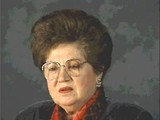
-
Charlene Schiff describes forced labor in the Horochow ghetto
Oral HistoryBoth of Charlene's parents were local Jewish community leaders, and the family was active in community life. Charlene's father was a professor of philosophy at the State University of Lvov. World War II began with the German invasion of Poland on September 1, 1939. Charlene's town was in the part of eastern Poland occupied by the Soviet Union under the German-Soviet Pact of August 1939. Under the Soviet occupation, the family remained in its home and Charlene's father continued to teach. The Germans…
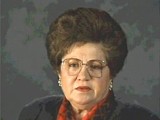
-
Madeline Deutsch describes adjusting to social and educational life after the war
Oral HistoryMadeline was born into a middle class family in an area of Czechoslovakia that was annexed by Hungary in 1938-1939. Her father worked out of their home and her mother was a homemaker. Madeline attended high school. In April 1944 her family was forced into a Hungarian ghetto. The family lived in the ghetto for two weeks before being transported to Auschwitz. Madeline and her mother were separated from her father and older brother. Neither her father nor brother survived the war. A week after arriving in…
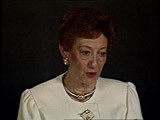
-
Thomas Buergenthal describes operations of international tribunals
Oral HistoryJudge Thomas Buergenthal was one of the youngest survivors of the Auschwitz and Sachsenhausen concentration camps. He immigrated to the United States at the age of 17. Judge Buergenthal devoted his life to international and human rights law. He served as chairman of the United States Holocaust Memorial Museum’s Committee on Conscience; was named the Lobingier Professor of Comparative Law and Jurisprudence at the George Washington University Law School; and served for a decade as the American judge at…
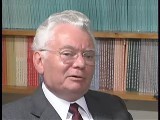
-
Deceiving the Public
ArticleThe Nazis frequently used propaganda to disguise their political aims and deceive the German and international public. Learn more.
